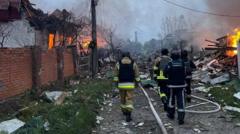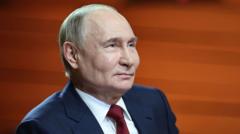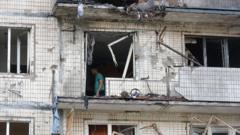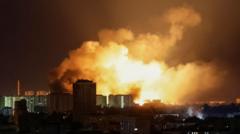As Ukraine endures relentless assaults from Russia, discussions of an election amid the ongoing conflict ignite debate over legitimacy and public sentiment.
**Could Ukraine Hold Elections Amid War? Speculations Intensify**
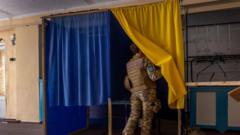
**Could Ukraine Hold Elections Amid War? Speculations Intensify**
Rumors regarding potential elections in war-torn Ukraine gain traction among political circles.
In Kyiv, the conversation about the feasibility of elections in Ukraine during Russia's aggressive invasion has resurged, even as the country grapples with constant bombings. Many deem the notion ambitious, especially considering the presidential election originally scheduled for 2024 has been paused due to martial law in place since the conflict escalated. There is skepticism surrounding proposals for elections, with government officials and citizens maintaining that unity in the face of adversity is paramount.
However, allegations persist that President Volodymyr Zelensky is contemplating elections, particularly as talks regarding a ceasefire progress. Trump has referenced Ukraine's electoral legitimacy, asserting conditions for ceasefire might include new elections. This week, Valerii Zaluzhnyi, a prominent potential rival and former military chief, publicly downplayed claims about his political ambitions amid the ongoing war.
In public statements, the head of Ukraine's Central Election Commission, Oleh Didenko, clarified that significant legal adjustments would be necessary before elections can occur. Current laws stipulate that parliamentary elections must take place 60 days after martial law ends, while presidential elections would extend to 90 days. As the war rages on, many speculate that more time will be required to ensure security and order.
Interestingly, reports have surfaced indicating Zelensky discussed potential elections with aides, under the assumption that the U.S. might facilitate a ceasefire and thereby create an opportunity for voting later this year. However, subsequent denials from government officials raise questions about the reliability of such claims.
Polls indicate Zelensky's approval ratings have risen amid recent political tensions, suggesting that now might be a strategic time for him to pursue re-election as political dynamics shift post-war. Observers note that such a move could leverage his position in any peace negotiations, countering Russia’s narrative about his leadership.
Despite these discussions, the challenges of holding elections during wartime remain substantial. Concerns around cybersecurity, voter accessibility, and the integrity of election processes linger, with criticisms of technology like the Diia app that aims to facilitate remote voting. These logistical issues, combined with public sentiment—78% reportedly oppose elections—cast doubt on the viability of electoral processes in Ukraine.
The upcoming parliamentary vote on martial law in May presents an important juncture, potentially influencing the political landscape depending on how Zelensky chooses to navigate this turbulent terrain.
However, allegations persist that President Volodymyr Zelensky is contemplating elections, particularly as talks regarding a ceasefire progress. Trump has referenced Ukraine's electoral legitimacy, asserting conditions for ceasefire might include new elections. This week, Valerii Zaluzhnyi, a prominent potential rival and former military chief, publicly downplayed claims about his political ambitions amid the ongoing war.
In public statements, the head of Ukraine's Central Election Commission, Oleh Didenko, clarified that significant legal adjustments would be necessary before elections can occur. Current laws stipulate that parliamentary elections must take place 60 days after martial law ends, while presidential elections would extend to 90 days. As the war rages on, many speculate that more time will be required to ensure security and order.
Interestingly, reports have surfaced indicating Zelensky discussed potential elections with aides, under the assumption that the U.S. might facilitate a ceasefire and thereby create an opportunity for voting later this year. However, subsequent denials from government officials raise questions about the reliability of such claims.
Polls indicate Zelensky's approval ratings have risen amid recent political tensions, suggesting that now might be a strategic time for him to pursue re-election as political dynamics shift post-war. Observers note that such a move could leverage his position in any peace negotiations, countering Russia’s narrative about his leadership.
Despite these discussions, the challenges of holding elections during wartime remain substantial. Concerns around cybersecurity, voter accessibility, and the integrity of election processes linger, with criticisms of technology like the Diia app that aims to facilitate remote voting. These logistical issues, combined with public sentiment—78% reportedly oppose elections—cast doubt on the viability of electoral processes in Ukraine.
The upcoming parliamentary vote on martial law in May presents an important juncture, potentially influencing the political landscape depending on how Zelensky chooses to navigate this turbulent terrain.







